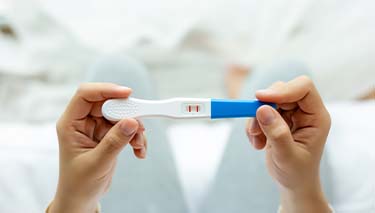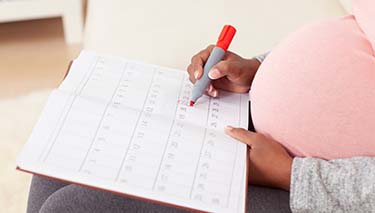Those five minutes between taking a pregnancy test and finding the result can feel like the longest five minutes of your life. And when you see the result and realise that you are holding a positive pregnancy test, it often seems a bit like a dream!
First thing to do, though, is make sure that you are, in fact, holding a positive pregnancy test before you go calling your friends, family, distant acquaintances, updating Facebook, sending out tweets and issuing a press release.
Take a deep breath, then go back and look at the instructions that came with the test. Did you follow them properly? Carefully compare the result on your test stick with the positive pregnancy test result on the instruction sheet – are they the same?
What does a positive pregnancy test mean?
In at least 97% of cases, if you’ve followed the instructions carefully, it means you are pregnant. If you’ve been hoping for a baby, congratulations! If this comes as a big shock to you, though, you’ve got a lot of thinking and decision-making ahead of you and may not feel like celebrating the news.
Most pregnancy tests give a positive result if there is a certain amount of the hormone human chorionic gonadotrophin (hCG) in your urine. Around 8 to 10 days after conception, the fertilised egg implants into the uterus wall, signalling your body to release hCG, and levels of the hormone then climb steadily for the next few months.
A more sensitive test (which will detect 15 mIU or over) will show a positive pregnancy test result much earlier than a less sensitive test (which might not give a positive pregnancy test result until there is 50 mIU or more of hCG in the urine.)
Medically, an hCG level that’s less than 5mIU/ml is considered negative for pregnancy, and levels above 25mIU/ml is considered a positive pregnancy test.
How can I be certain the pregnancy test really is positive?
False positive pregnancy test results, while rare, do occur sometimes.
If you don’t look at the test until after the ‘expiry’ period (usually around ten minutes) then you might get an evaporation line, which can be confused with a positive result. (Did I mention checking the instruction sheet carefully?)
If you are taking certain fertility drugs or any other medication which may artificially raise the levels of hCG in your body, it is possible to get a false positive pregnancy test result. Or, if there is a manufacturing error in the pregnancy test kit itself, you may have an error in the test – but it’s pretty rare for this to occur.
One way to be sure is to do another pregnancy test. If you want to be really neurotic about it (and I have to confess I did this with my third pregnancy!) – you could go to the pharmacy and purchase a different brand of pregnancy test, then try again (perhaps first thing the next morning, when the hormone levels tend to be higher.)
Your next step should be to make an appointment with your doctor to confirm and discuss the positive pregnancy test results, get a checkup and some guidance on what is best for you to do next.
Do be aware that between 25 and 50 percent of fertilised eggs don’t make it past the first few weeks, and a further 15 per cent of recognised pregnancies end in miscarriage.
One of the well-known issues that have come up since newer, more sensitive pregnancy tests that can be taken up to a week before your period is due, is that many women become aware they are pregnant in the earliest stages of pregnancy, when the chance of early miscarriage is very high.
This might mean that you experience a pretty big emotional roller coaster; you realise you are pregnant and go through all the emotions that accompany that discovery, and then you get what seems to be a normal period, and can also involve your body expelling the pregnancy, which at that stage is such a small amount of tissue that it may not feel any different at all.
For this reason, many women choose not to do a pregnancy test until the after their period is due.
What if the positive pregnancy test is very faint?
There are a few different reasons for you to get a very faint line in a positive pregnancy test.
First, you might have very low levels of hCG, usually because it is very early in the pregnancy, or in some cases, because your body is not producing the usual amount of the hormone.
Low hCG levels can occur in quite normal pregnancies, everyone is different, so don’t stress out about it too much. You’ll find out more information about how everything is going as the pregnancy progresses.
Some tests will give a faint response in the case of low hCG levels. Taking another pregnancy test in a few days should then give you a far stronger result – if you can wait that long.
If you’re feeling impatient, but you didn’t do the test first thing in the morning, you might want to try that next time because this is when hormone levels in the body are at their highest.
Good luck!
By Fran Molloy, journalist and mum of four
Last Published* May, 2024
*Please note that the published date may not be the same as the date that the content was created and that information above may have changed since.





















